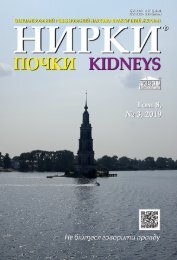You also want an ePaper? Increase the reach of your titles
YUMPU automatically turns print PDFs into web optimized ePapers that Google loves.
Òåìà íîìåðà
Cover Story
UDC 612.467-616.61.002
DOI: https://doi.org/10.22141/2307-1257.10.2.2021.234319
Mariia D. Ivanova 1 , A natoliy I. Gozhenko 2 , Tommy Crestanello 3 , Dmytro D. Ivanov 1
1
Shupyk National Healthcarå University of Ukraine, Kyiv, Ukraine
2
Ukrainian Scientific Research Institute of Transport, Odesa, Ukraine
3
Milan, Italy
Coaching to increase water intake in CKD 1–5:
overview and detailed analysis of three clinical trials
Abstract. Parallel two-group prospective multicentre randomized trial named “HYD45 — Hydration in CKD
4–5 stages” that enrolled 62 patients with CKD G4–5 was aimed at evaluating of estimated glomerular
filtration rate (eGFR) with coaching to increase water intake (CIWI) with the achievement of minimally
higher diuresis by 400 mL in 31 patients compared with the CKD G4–5 group without CIWI. The stated duration
was 12 months, and the trial was terminated in 6 months due to a more pronounced eGFR drop in
the CIWI group, namely –3.3 ml vs. 2 ml in the group without CIWI. EGFR, renal functional reserve (RFR),
albumin-to-creatinine ratio, and patient’s quality of life were additionally analyzed in this trial. Finally, three
randomized clinical trials were analyzed in which patients with CKD 1–2, 3, and 4–5 received hydration.
The results of studies demonstrate the possible efficacy of CIWI in stage 1–2 CKD in patients with normal or
increased renal functional reserve. In stage 3 CKD, CIWI showed no benefits, and in stage CKD 4–5, forced
hydration resulted in greater renal function loss. Summarizing these data, the authors concluded that it is
probably appropriate for healthy people to consume the amount of fluid that provides physiological diuresis
of 1.2–1.8 L and urine normal osmolarity. CIWI is often excessive, forced excessive hydration may not
promote a healthy lifestyle. CIWI becomes forced excess hydration as kidney function decreases. Possibly,
the benefits of CIWI are lost in CKD with the progression of renal function reduction. The effect of CIWI for
12 months may be positive for stage 1 CKD and stage 2 CKD with normal functional renal reserve. CIWI is
probably impractical for chronic stages 3–5 CKD. In CKD 4–5, RFR is not preserved, which probably explains
the negative effect of CIWI. With CKD G1, the CIWI leads to the optimal preservation of the renal function
with the increase of GFR per 1 ml/min/1.73 m 2 per year in comparison with the same water intake. In CKD
G2, CIWI prevents physiological and pathological loss of renal function, RFR above 50 % provides restoration
of eGFR in CKD G1–2. Early Coaching to Increase Water Intake in CKD (ECIWIC) trial demonstrates
benefits of CIWI in patients with CKD G1–2 and preserved RFR and may be recommended to delay the
CKD worsening.
Keywords: early coaching to increase water intake in CKD; eGFR; renal functional reserve
Background
In observational studies, increased water intake improves
kidney function but not in adults with chronic kidney
disease (CKD) stage 3 and more and strongly depends
on renal functional reserve (RFR) [1–3]. The CKD WIT
trial has shown a nonsignificant gradual decline in kidney
function after 1 year of coaching to increase water intake
(CIWI) [3]. The CIWI (Early Coaching to Increase Water
Intake in CKD — ECIWIC trial) benefits in CKD
stage 1–2 (G1, G2) depends on RFR [4]. A recent study
has shown that in patients with CKD, the relation between
plain water intake and progression to kidney failure appears
to be U-shaped; both low and high intake may not be beneficial
in CKD [5].
The parallel-group randomized trial was aimed to determine
the effect of CIWI on estimated glomerular filtration
rate (eGFR) and RFR in adults with CKD stage 3 and CKD
stages 4–5.
© «Нирки» / «Kidneys» ( ), 2021
© Видавець Заславський О.Ю. / Publisher Zaslavsky O.Yu., 2021
Для кореспонденції: Іванов Дмитро Дмитрович, доктор медичних наук, професор, завідувач кафедри нефрології і нирково-замісної терапії, Національний університет охорони здоров’я
України імені П.Л. Шупика, вул. Дорогожицька, 9, м. Київ, 04112, Україна; e-mail: ivanovdd@i.kiev.ua
For correspondence: Dmytro D. Ivanov, MD, PhD, Professor, Head of the Department of Nephrology and Renal Replacement Therapy, Shupyk National Healthcare University of Ukraine, Dorohozhytska st.,
9, Kyiv, 04112, Ukraine; e-mail: ivanovdd@i.kiev.ua
Full list of authors information is available at the end of the article.
8 Íèðêè, ISSN 2307-1257 (print), ISSN 2307-1265 (online) Òîì 10, ¹ 2, 2021














